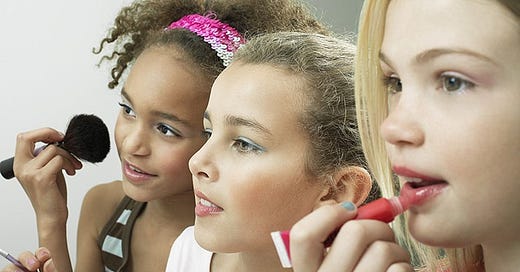Social Media is Fuelling Consumerism and External Validation in Girls
Sephora, Stanley, and Starbucks, oh my!
When I was in highschool, many of my friends came from wealthier families than mine. I remember feeling so envious of the brands they would wear to school- Abercrombie & Fitch, Hollister, Guess. I didn’t want to feel left out, so I took to eBay and bought knockoffs. They would arrive and I’d be so excited to pretend I had the ‘cool clothes’ just like them! At that time, I was ‘influenced’ by my peers- kids at my highschool, or the teens who worked at the local mall.
Flash forward to today, and kids are being influenced by online ‘kidfluencers’ who amass hundreds of thousands of followers and millions of views by posting about their 'clothing hauls’, or their ‘morning skincare routines’ on Youtube, Instagram and Tiktok. Brands have jumped on board, creating skincare lines specifically targeted at kids.
Given that adolescents are averaging 4-6 hours per day on social media, they are constantly flooded by ads about what they ‘need’. This has produced frenzies about products like Stanley tumblers and Sephora products. Kids have begun to believe, like truly believe, it’s important for them to have a 12-step skincare routine. And let’s be honest, kids are the perfect target for ad marketing- vulnerable, impressionable, and yearning for acceptance.
At such young ages, kids are being told what they need in order to be happy. And it isn’t nature, hugs, experiences and time with loved ones- it’s things. They are being bombarded with messages by influencers and ads that they need these things in order to be ‘enough’. They’re begging their parents for product after product, believing that this is the ticket to happiness and popularity, or maybe to just avoid being bullied.
Middle schoolers are being bullied for not having Stanley tumblers: They ‘laugh and point’
While doing research for this post, I was honestly shocked at the number of kids posting videos similar to the ones above- using more products than I’ve ever used, filming themselves in bed and in their pyjamas (which is a whole other topic- think- exploitation and predators). It almost feels like a pyramid scheme of consumerism. Kids see other kids making videos and getting tons of notoriety, so they hop on board themselves and try to influence other kids. Brands make money, the kids make money- everyone is happy, right?
An interesting study conducted by Ruling Our Experiences surveyed girls from 5th-12th grade about stress and well-being. 65% of girls say they put pressure on themselves to be perfect, and 79% report feeling like they’re going to “explode” because of pressure. Additionally, 89% of girls feel pressure to fit into specific roles or stereotypes.
“Girls are trying to figure out who they are and figuring out relationships, friendships etc. Girls also get very stressed out, and I feel like now more than ever, girls are not confident with their image because of social media.”- 8th grader from Iowa
I have kids come to my office that are so heartbreakingly consumed with stress and self-loathing. And truthfully, I can’t imagine being a teenager right now. ‘Pressure’ is an understatement. They’re being sold this fallacy that if they just have the things they’ll be happy. And furthermore, if they post about those things online for strangers to view and give them validation, they’ll be even happier.
If only they could see that this screen they’re staring at for so many hours a day is fuelling this never-ending quest to be ‘enough’. How can you be enough when you’re comparing yourself not to just your peer group, but to a sea of kids online pretending to be something they’re not? If only they knew that those kids on the other side of the screen were struggling just as much as them.
And don’t get me wrong- I have nothing against kids wanting to play with makeup, or enjoy some Starbucks here and there. As little kids we all wanted to act like we were older. But it’s when they think they need these things in order to be happy, liked, and accepted by people they’ve never met that irks me.
So how can parents help? If your kids aren’t on social media yet- wait. Delay as long as you can, at least until they are through puberty. Talk to your kids about this idea of consumerism. Educate them about how they are the product when they’re on social media. Talk to them about what really makes people happy- time with loved ones, time outside, experiences. Lead by example. Avoid talking about beauty and appearances.
Teach them that if they want things, they need to earn them. Teach them the value of a $50 face cream from Sephora. And once they’re online, please, keep an eye on what they’re seeing and doing and limit how much time they spend. Social media can be a boiling pot for a vulnerable child.





